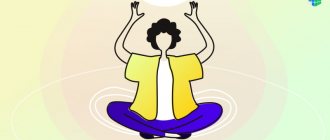- September 7, 2018
- Psychology of thinking
- Valentina Buravleva
Often, in pursuit of success, people forget about their real desires, run by inertia, and as a result, chronic fatigue, apathy, and lack of emotions, including positive ones, arise. Most often, the reason is incorrect prioritization, expenditure of energy not on one’s desires, the effect of “living a life that is not one’s own.”
I don’t know what I want, or whether I want it?
When exploring a person’s true desires, as well as the reasons why a person does not hear them, psychologists usually turn to the patient’s childhood, because the roots of most psychological pathologies are laid precisely in this period of life. Parents may often discount their child's wishes. Thus, a feeling of desirelessness arises. It seems to a person that he no longer wants anything. It also happens that in infancy a child cries, and an inexperienced mother does not give the child what he needs. When a child is fed for every cry, a dependence on food eventually develops.
In case of stress, already in adulthood a person eats up all his problems. Of course, it is not the parents’ fault that they failed to recognize the child’s wishes in time. Another thing is important: as an adult, a person must determine for himself what he wants, realize his true desires. Why is this necessary? If you do not define your desires, then other people will begin to use such a person and manipulate him to satisfy their needs.
Intuitive drawing
Give yourself time for associative “scratching exercises”. Draw whatever you want, from lines and zigzags to complex compositions with several active characters and lots of details. Take paints and color the resulting image. You can immediately use colored pencils and markers.
This is where the Luscher test comes in handy. It can be easily accessed on the Internet. Remember the colors you like the most and the ones you like the least. Look at your picture. If you portray yourself in a color that is unpleasant to you, then something is going wrong.
Let's imagine that you don't like blue, but love green. You will draw blue everything that you subconsciously don’t like, and green what you really like. For example, a girl draws a catwalk model with her least favorite color. Consciously, she thinks that this is her ideal, but her subconscious responds differently. Some aspirations are instilled in us from the outside. A color test will help reveal differences and determine what is really important to you.
I want or must: attitudes that are established in childhood
There is a category of people who constantly do “good deeds” for others, often forgetting about themselves and their inner needs. Such people often burn out at work, suffer from chronic fatigue, cannot relax, and so the person becomes a workaholic. Nevertheless, such people are loved very much, but this does not make it easier for them.
If you look at childhood, in most cases the main mistake of parents is considered to be excessive control over the child. The child begins to be ruled by the fear of not meeting the expectations of his parents. He gradually loses the ability to recognize his true desires. Excessive criticism by parents takes a painful form. This is how the child develops dependence on the opinions of others and a decrease in self-esteem. The need to care for loved ones is a wonderful feeling, but it should not be to the detriment of oneself and others.
When such a child becomes an adult, he accustoms himself to please other people in everything and always. He had no other way to feel like a full-fledged person. Therefore, when such a person hears praise, he feels “good”; if for some reason he fails to please others (which happens extremely rarely with such people), then he feels “wrong”, “bad”. In such a state, it is almost impossible to determine your true desires.
Anatomy of the psyche
Sigmund Freud divided personality into three components:
“I” is a conscious part of the personality, the human mind. It controls mental processes and maintains the connection between instincts and actions. “I” lives according to the principle of reality, receiving energy from the unconscious depths. It resists the unacceptable desires of the subconscious and the oppression of conscience. “I” am the creator of harmony. “It” is an unknown force that controls a person. It does not react with the real world, but depends on it. “It” is controlled by ancient instincts, trying to ease mental tension, create comfortable conditions and fulfill the natural purpose of a person. In “It” live “wrong” desires, repressed by the censorship of consciousness. The “super-ego” is a judge, a merciless critic and a moralist. This is human conscience. The “Super-Ego” limits the “I” and restrains the “Id”.
Find a way to yourself
To learn to hear yourself, you need to go through a fairly long path of becoming, the ability to recognize the voice of your intuition. Often for such people this process can take months or years. The path to yourself can be overcome much faster when accompanied by a competent psychotherapist.
But you can do something yourself. How to understand your true desires? First, you need to start fulfilling your “wants,” even if they seem completely ridiculous and illogical. If you feel like laughing or crying, you should do so. If you want to be alone, then you shouldn’t deny yourself this aspiration either. There is no need to ignore your desires, even if it seems difficult or goes against the expectations of others. Over time, you will be able to quickly understand which desires are true and which are imposed by society.
“What difference does it make where to relax…”
A couple of years ago, my neighbor was going to spend his vacation at the dacha - fishing, swimming in the river and just lying on the grass, doing nothing. And his wife dreamed of the sea and spent a whole year trying to persuade him to buy an “all Inclusive” tour. In the end, he gave up: “In the end, what difference does it make where to lie around and do nothing - on the grass near a dacha near Moscow or on a Turkish beach?”
My wife bought tickets, and then it all started... On the eve of the flight, a neighbor tripped and sprained his ankle. The taxi that was supposed to take them to the airport was late, and the travelers had to “vote” on the highway. They made it to the plane, although they had to be seriously nervous.
But the troubles didn't end there. The air conditioning in the hotel did not work, and when it was repaired, my neighbor managed to immediately catch a cold. So he had to lie not on the grass or on the beach, but in bed - almost until his departure.
This is how the “alien door” worked. My neighbor still remembers that vacation with an unkind word.
To avoid falling into other people's doors, learn to manage your reality. Sign up for a free master class and receive step-by-step instructions on how to accurately open the “right” door.
SIGN UP FOR A MASTER CLASS
Have you ever mistook other people's goals for your real desires? Have you ever knocked on other people's doors? Share in the comments.
Desire or duty? An instructive story about desires
One winter, a beggar was sitting by the embankment. A successful entrepreneur drove past in his expensive car. Seeing a beggar, he stopped, took a jacket from the trunk, gave it to him and drove on. The same situation, but a middle-income engineer was passing by, he was coming from the factory. Seeing a beggar, he took pity on him and felt that he must definitely help this poor man. The engineer took off his jacket, gave it to him, and went home. What happened in the end? The engineer fell ill, went on sick leave, and received a lower salary. For this reason, his family was forced to go into debt. The moral here is this: you need to help according to your capabilities, otherwise you can harm not only yourself, but also your loved ones.
This story metaphorically teaches you to distinguish your true desires and goals from a sense of duty. Often a person feels that he is obliged to perform certain actions. But, acting in accordance with this obligation, he does not feel truly happy. To distinguish your true desires from your duty to family or society, you need to ask yourself: will I really be happy if I do this? Will this action bring me joy or, on the contrary, will it entail any inconvenience for me personally?
It is also useful to ask yourself whose dream it really is. For example, a mother who did not become a professional dancer begins to impose this desire on her daughter. Her motive is expressed in the words: “Do it for me.” The daughter, on an unconscious level, begins to absorb this desire, taking it as her own. An adult is free in his judgment and can choose what to do and what to abstain from. The easiest way to distinguish a personal desire from an imposed one is to ask yourself: whose dream is this - mine or imposed by someone from the outside?
Deaf phone
We often play dead phone with ourselves, and the subject of the game is our own life. Desires that originate in your true self reach you through the prism of the mind, which tends to rationalize everything and adjust it to generally accepted models and standards of behavior. For example, if your true self wants to explore your sexuality and experiment in bed, reaching the mind, this desire is condemned by it due to upbringing and public morality. As a result, you are forced to suffer and judge yourself for your sexual desires, and if you satisfy them, you will feel even more shame and dissatisfaction with yourself. This is how a “dead telephone” works between consciousness and subconsciousness, absolutely all people are susceptible to this, since we have our own essence - the true “I”, on which layers of beliefs, principles, and restrictions are superimposed as we grow up and integrate into society.
Read also: I.1. Types of matrices and their determinants
A written way to learn about your dreams and desires
How to understand your true desires using this method? To do this, you need to take a pen and a piece of paper. Then set the timer for 15-20 minutes. At the top you need to write a heading: “What do I really want?” Then they begin to write as quickly as possible - just like when listening to an interesting lecture, when you want to take notes on as much useful information as possible.
To do this, you need to turn off the part that is usually called the “inner critic.” If all the ideas have already been exhausted, and the time has not expired, you can repeat yourself, but you cannot stop.
The technique must be performed more than once - psychologists recommend doing it for three more days. After all four days have passed, true dreams will become much clearer. There will be an understanding of what exactly the soul wants.
Look for a connection
Is your desk generously strewn with scribbled paper? Great! Hang “obituaries” everywhere, notes about childhood and new skills - let the “landmarks” be visible. Record every idea or assumption—no detail should be overlooked during the search process. Look for recurring themes and motifs among the scraps of your self: perhaps some of your deep desires have already manifested themselves and are waiting for you to discover them.
Based on materials from the book “Between I Need and I Want”
Post cover: unsplash
Imagine yourself as an object
How to understand your true desires and goals using this unusual method? The technique can be performed in any room – at home or in the office. Looking around, you need to select any object from the environment. It could be a clock, a front door, a juicer - anything.
Then you need to imagine yourself as this object and make a short speech on its behalf. For example: “I am a porcelain cup that always performs its function. Thanks to me, a person can enjoy aromatic tea, as well as a beautiful image on my surface. I can withstand high temperatures, and the tea in me turns out very tasty. I just need to wash it a little more often. And how scary it can be when they put me on the very edge of the table - my heart just sinks into my heels...”
It is necessary to imagine yourself with this or that object for at least twenty minutes. On behalf of the chosen thing, you can boast or complain about life. After some time, especially towards the completion of this task, insights begin: the person performing the exercise begins to learn a lot of new things about himself - especially about his main purpose in this life.
On the path of self-determination
It takes time to understand yourself. Insight will not come to you the minute you decide to try a new experiment. Self-knowledge lasts a lifetime. You and your desires change. The main thing is to be able to determine the direction.
Communicate with your subconscious. When bringing hidden desires into conscious space, do not be afraid to fulfill them (if this does not harm others). Learn to immerse the idea into the subconscious yourself, then it will mobilize all its forces to fulfill the desire. Use your hidden abilities.
Use visuals to activate the subconscious. It’s not enough to think about your desire, you need to imagine it in all its colors. The more believable and convincing the picture, the higher the likelihood that you will achieve your goal. For example, if you want to move to another city, think about it, imagine its streets and yourself wandering through them. Draw in your fantasies a new apartment with a view of local attractions, think through the smallest details, feel that you are happy in the new place. This will convince the subconscious, and it will open up your internal reserves for further actions.
Dialogue with a friend (friend)
Since it is often impossible to find out true desires without thoughtful dialogue with yourself, this method turns out to be especially effective. Indeed, in this case, a person does not just ask himself a question about his own calling - he hears questions not from himself, from a loved one, and therefore the answers to them can be more objective.
The method is performed as follows. A friend (or boyfriend) sits down next to you and asks: “What do you want in life?” The examiner answers himself, and then she asks: “Why do you need this?” After the next answer, the interlocutor asks again: “What is this for? What will it give?".
So it is necessary to continue further - until some insight arises, or simply up to ten questions. Practice shows that at the end of the exercise a person looks at his true desires completely differently, how to determine which is described in this article.
Graphical method
If you decide to use this method, you will need paper and pen. The first question to answer is: “What kind of person are you?” We write 10-20 associations.
Then we draw a table with two columns “like” and “dislike”. In it we write everything that comes to mind: emotions, actions, events, people, habits. This will help you understand yourself. Don't be disingenuous. Write as it is, then you will have your own map by which you can navigate.
Rate each item from 1 to 10. Which column has more entries? What is more important to you and makes you experience more vivid emotions and feelings? When trying to analyze events, pay attention to your place in them. What role were you assigned?
Don't try to evaluate yourself as a "bad" or "good" person. Look at your preferences and aspirations from the outside.
Dreams
One of the simplest methods. Freud called dreams the “royal” road to the human unconscious. Since a person very quickly forgets all his dreams after waking up, they must be written down. Psychologists do not recommend relying on dream books, since a person’s dreams have not a general, but a personal meaning. There is no book written about the dreams of a particular person. You should also initially discard those dreams in which daytime information is processed, those impressions that were received while awake.
Other plots can be subjected to research: “What exactly does this dream mean? What message does the unconscious want to convey to me through it? If the meaning of the dream remains unclear, you can try to put yourself in the shoes of each character from the dream and answer the question: “What do I (the security guard, the seller, the dog, the indoor flower) want to say or do?”
A look into the future
Think about what your goals are? Do you have specific plans for the future and ideas about ways to move towards your goal? What are you doing to achieve it now? Consider whether you enjoy this process. Where did the idea come from, did you make the decision yourself?
If you're in law school and don't know what to do next, there's a good chance you're in the wrong place.
Following inspired desires leads a person to a dead end. The lack of a goal and idea of the result indicates that the actions are unnatural.
Ways to achieve what you want
When real desires are identified, all that’s left is to start realizing them. How can this be done? The main points to remember are:
- Concentrate only on your main desires. When a person distributes his attention simultaneously between several goals, achieving them becomes extremely difficult.
- Visualize the end result of achieving the goal. This will help you gain additional motivation to continue working towards realizing your desires.
- Pursue your goal despite setbacks. You cannot avoid dark streaks in life, but this should not stop you on the path to your dreams. You need to work on realizing your desires both on happy days and on unsuccessful ones.
- Record intermediate results. It is necessary to set small goals every day, and in the evening write down what you have achieved.
The difference between a person’s true desires and those imposed on him from the outside is great: the former contain a special energy that cannot help but be felt. When a person is in contact with his deep “I”, when he hears himself well, new resources begin to connect from within, helping to realize these goals and plans. There is no need to persuade yourself while working. When the results are obtained, a feeling of joy and satisfaction comes.
Let's take a look inside
The subconscious is a continuous process. It consists of many reactions occurring in the brain.
What is the essence of the subconscious?
Subconscious processes are not reflected by consciousness. Your brain is doing a titanic job that you are not aware of. The unconscious controls your behavior. It involves the body's biological reactions. Love, maternal instinct and all manifestations of sexual behavior are the sphere of the unconscious. The subconscious mind predicts and protects. Yes, he cares about your safety and comfort, but conscious and unconscious ideas are different from each other. Everything ingenious is a product of subconscious processing of information. You load everything you need into your brain, and it works, without your participation in the process. By connecting different groups of neurons, the subconscious mind produces a simple idea that the conscious mind assigns to itself. Intuition is part of the unconscious. The more closely you come into contact with it, the more it prompts and guides.
Do you want to know about your true desires? Ask the subconscious. It knows everything.
Happiness of the process
How to understand: a true desire or not? This is surprising, but with a real goal, the focus on the importance of achieving it usually decreases. It is quite difficult to explain this phenomenon.
You kind of want to get it, but you’re underestimating the degree of importance a little. You get the feeling that you have already received this desire, and it has fit quite firmly into your life.
This is not greedy desire, but the calm joy of possession.
And at this moment the person enjoys the process itself more. He knows that the desire is already in his pocket. At the moment, all he can do is enjoy the present moment. And the steps he takes towards his goal.










